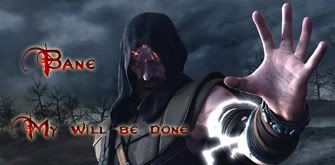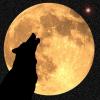BG Character's Gods
#1
 -Guest-
-Guest-
Posted 21 April 2005 - 06:34 AM
The characters whose gods are known:
Minsc: Mielikki
Jaheira: Silvanus
Viconia: Shar
Aerie: Baervan Wildwanderer/Aerdrie Faenya
Keldorn: Torm
Anomen: Helm
Mazzy: Arvoreen
Valygar: A known atheist
Those who don't have their gods mentioned include:
Imoen: I'd suggest either Mystra or Tymora
Edwin: Far too proud to worship anyone but himself
Korgan: Perhaps Abbathor although possibly Clangeddin
Nalia: I'd suggest either Mystra, Ilmater or Siamorphe
Yoshimo: Most likely Tymora
Jan: Either Baravar or Garl
Haer'Dalis: Most like an atheist
Cernd: Either Silvanus, Eldath or Selune
Sarevok: Unlikely he'd worship any living god
#2

Posted 21 April 2005 - 06:48 AM
Edwin could be like other red thayvian wizards and worship Kossuth the fire tyrant out of a desire for more power.
Defy me and die!

#3

Posted 21 April 2005 - 07:09 AM
#4

Posted 21 April 2005 - 07:32 AM
Cernd - Eldath and Selune
Edwin Odesseiron - none (but pays lip service to at least one of the following: Azuth, Beshaba, Cyric, Iyachtu Xvim, Kossuth and Mystra)
Haer'Dalis - entropy (not a god, but a concept)
Imoen - Oghma (one of only four gods with priests in Candlekeep, the others being Deneir, Gond and Milil)
Jaheira - Silvanus
Jan Jansen - Baravar Cloakshadow
Korgan Bloodaxe - Abbathor
Minsc - Khelliara (an alias of Mielikki)
Nalia De'Arnise - Ilmater
Valygar Corthala - while rangers in D&D normally don't have to have a god, in the Forgotten Realms they do... that is if they want to be able to cast any spells. So either Valygar is lying about not worshipping any gods, or for some reason a god is granting him spells without him realizing.
Yoshimo - the Celestial Beauracracy, particularly Chann Cheng (War, Martial Arts, Combat, and Bravery) and Hsing Yong (Fortune and Prosperity).
Edited by NiGHTMARE, 21 April 2005 - 09:53 AM.
#5

Posted 21 April 2005 - 07:38 AM
I really don't see Imoen worshipping any god... but Mystra would probably be her choice. And Korgan probably doesn't see any point in following gods...
Imoen's godlessness is strange.
I think that she isn't a character that fits Forgotten Realms.
She seems to be a teen from XXth century put in a fantasy world.
Edited by Delight, 21 April 2005 - 07:45 AM.
#6

Posted 21 April 2005 - 07:40 AM
Her will worship me in the end or perish.
Free your mind
#7
 -Archmage_as_guest-
-Archmage_as_guest-
Posted 21 April 2005 - 09:09 AM
#8

Posted 21 April 2005 - 10:31 AM
Or did Bioware just do it that way because they didn't feel like including another temple-area?
-Laughton Lewis Burdock-
#9

Posted 22 April 2005 - 08:18 AM
It's very rare for anyone to be a real atheist in most of the official AD&D settings. The gods exist and take measures to prove their existance, and can be plainly proven, so belief is extremely common. Faith, or worship is less common.
#10

Posted 22 April 2005 - 11:43 AM
#11

Posted 22 April 2005 - 12:52 PM
Well, after this little incident at spellhood you can bring his heart to the temple of Ilmater and the priest said he would "take care of it". I thought that would mean he had at least some faith in him.
Or is this heart-taking-thing is something that can be done to every person? I mean, how much influence would this have on Yoshimo's afterlife?
-Laughton Lewis Burdock-
#12

Posted 22 April 2005 - 06:40 PM
Yoshimo comes from Kara-Tur not the Forgotten Realms, so why would he worship a Forgotten Realms god?
Same planet.
Also, this is a polytheistic setting. People mix and match gods from all over. They generally stick to the local pantheon, but only the fanatics would have a problem with other gods whose views were similar to their own.
It was probabaly obvious to Yoshim that the Faerunian gods held sway in Faerun so defering to them would not be a bad idea. Illmater was also the diety that seemed most pertenent to Yoshimo's suffering.
Or is this heart-taking-thing is something that can be done to every person? I mean, how much influence would this have on Yoshimo's afterlife?
Maybe none. Maybe his torment would have casued him to come bakc as a ghost or something. Maybe the geas was poweful enough to extend beyond death. Maybe Yoshimo was being more figurative than literal. Who knows?
#13

Posted 23 April 2005 - 03:12 AM
So? FR gods have no power or temples in Kara-Tur, and visa versa.Same planet.
Imagine this: in the 15th century of the real world, a Chinese man who has grown up in a country steeped in ancient Chinese Mythology and knows and venerates one of the Chinese religions (be it Daoism, Buddhism or Confucianism) decides to pay a visit to western Europe. Would he suddenly convert to Roman Catholicism upon his arrival? I don't think so somehow.
I would suggest he only turned to Ilmater at his final moment, knowing that none of his own gods would have the ability to save him, since they can take no direct actions within the Realms.
Edited by NiGHTMARE, 23 April 2005 - 03:17 AM.
#14

Posted 23 April 2005 - 03:23 AM
EDIT: Yea, 1600th post!
Edited by Archmage Silver, 23 April 2005 - 03:24 AM.
#15

Posted 23 April 2005 - 08:58 PM
So? FR gods have no power or temples in Kara-Tur, and visa versa.Same planet.
They have power everywhere except those places they are specifically excluded from by a being of similar strength or special circumstances.
A greater FR god could instantly strike dead any mortal being on Oerth, if it chose to do so. Of course they wouldn't as oerth does not really concern them enough to piss off the native gods. They can grant spells and receive power from worshipers damn near anywhere. From the deepest layers of the abyss, to the quasielemental planes.
Imagine this: in the 15th century of the real world, a Chinese man who has grown up in a country steeped in ancient Chinese Mythology and knows and venerates one of the Chinese religions (be it Daoism, Buddhism or Confucianism) decides to pay a visit to western Europe. Would he suddenly convert to Roman Catholicism upon his arrival? I don't think so somehow.
Who said anything about Yoshimo converting. I think it's actualy improbable that he worshiped in any organized fashion anyway. In most AD&D settings most gods are acknowledged by damn near everyone that has heard of them. Only a tiny fraction of people actively follow an organized doctrine set forth by a specific god.
Many real world polytheistic religions where very accepting of new gods/religions, provided the teachings of such religions did not directly contradict their existing beliefs. Other gods where integrated into existing pantheons and practices.
In Shinto for example, Buddha, a foregin concept, is seen as one of many Kami (gods).
Even among devoties of later monothestic religions, offerings, prayers and other such stuff was often given to various divine or semi divine beings that may or may not be part of the core religion.
In a fantasy context, I think a good example of this type of stuff comes from the first Conan movie. Conan and Subotai talk to eachother about their gods and argue about which is more powerful, but they never really question the existance of the god they other is vouching for. Later if either of them finds himself in a situation where one of the gods they know about seems be more relevant they may acknowledge that god in some favorable way. If Subotai was in need of some violent revenge, well a prayer to Crom might not hurt. Like wise, if Conan was strugling through a storm, he might demand that Subotai's sky god get it out of his way.
Edited by oralpain, 23 April 2005 - 09:00 PM.
#16

Posted 24 April 2005 - 04:55 AM
I'm afraid you're wrong there. First, Oerth has plenty of greater powers who could stop a foreign god from interfering. Second, D&D deities almost always have absolutely no power on Prime Material worlds they're not native too. There are a few exceptions (generally gods of travel and knowledge), though even they still have to recieve permission from the native pantheon of gods.They have power everywhere except those places they are specifically excluded from by a being of similar strength or special circumstances.
A greater FR god could instantly strike dead any mortal being on Oerth, if it chose to do so. Of course they wouldn't as oerth does not really concern them enough to piss off the native gods. They can grant spells and receive power from worshipers damn near anywhere. From the deepest layers of the abyss, to the quasielemental planes.
Numerous books back this up, including the Spelljammer books Realmspace, Krynnspace and Greyspace. Some gods, particularly gods of nature, can't even grant spells to worshippers on other planets within the same crystal sphere (read: solar system).
Remember that a god's power in a world depends how many worshippers he has there. So if Ilmater teleported ten thousand members of his clergy to Oerth he probably would be able to grant them spells, though he and they would also probably have a fight on their hands with the native gods and their worshippers.
The most powerful of the gods of Aber-Toril, Ao, personally prevents gods from one part of the world from interfering in another part, such as granting spells to clerics (plus druids, paladins and rangers), striking people down, etc. As well as the Realms and Kara-Tur, this includes Maztica and Mulhorandi/Unther.
There are a few gods who are part of more than one pantheon, such as Sharess and Hoar, and gods are still free to send their clerics to other parts of the world, and even have them build temples there - they just won't be able to cast any spells or even commune with their gods. An example of this is in Maztica, where various temples (particularly of Helm) have been set up in the new colonies. Priests of Helm take part in some of the most violent attrocities committed by the settlers upon the natives, and it's doubtful this would happen if they were still in contact with their god.
There are no temples of Forgotten Realms gods in Kara-Tur because neither the native gods nor the native governments would allow it, and there are no temples of Kara-Turan gods in the Forgotten Realms because not enough Kara-Turan people live in the Realms to warrant any.
In Kara-Tur, religion is not something that you chose to take part in, it's part of the way of life, and every citizen is expected to worship at least one of the Celestial Bureaucracy. In some Kara-Turan countries, not worshipping the gods is punishable by death, in others by banishment. Even in the most lenient countries, you would become a social outcast.Who said anything about Yoshimo converting. I think it's actualy improbable that he worshiped in any organized fashion anyway. In most AD&D settings most gods are acknowledged by damn near everyone that has heard of them. Only a tiny fraction of people actively follow an organized doctrine set forth by a specific god.
I could be wrong, but I believe the barbarians of the Hordelands are mainly descendants of people who've been banished from various countries in Kara-Tur, often because they were accused of heresy.
Edited by NiGHTMARE, 24 April 2005 - 05:15 AM.
#17

Posted 24 April 2005 - 05:56 PM
I'm afraid you're wrong there. First, Oerth has plenty of greater powers who could stop a foreign god from interfering. Second, D&D deities almost always have absolutely no power on Prime Material worlds they're not native too. There are a few exceptions (generally gods of travel and knowledge), though even they still have to recieve permission from the native pantheon of gods.
Numerous books back this up, including the Spelljammer books Realmspace, Krynnspace and Greyspace. Some gods, particularly gods of nature, can't even grant spells to worshippers on other planets within the same crystal sphere (read: solar system).
Numerous books also directly contradict this.
I have seen material that supports power of nature being limited on some prime worlds, but Kara-Tur, Faerun, Zahkara, the horde lands, and Maztica are all on the same planet.
Remember that a god's power in a world depends how many worshippers he has there. So if Ilmater teleported ten thousand members of his clergy to Oerth he probably would be able to grant them spells, though he and they would also probably have a fight on their hands with the native gods and their worshippers.
Many sources suggest that a gods power is related to total worshipers/strenght of worship regardless of where those worshipers are.
There are a few gods who are part of more than one pantheon, such as Sharess and Hoar, and gods are still free to send their clerics to other parts of the world, and even have them build temples there - they just won't be able to cast any spells or even commune with their gods. An example of this is in Maztica, where various temples (particularly of Helm) have been set up in the new colonies. Priests of Helm take part in some of the most violent attrocities committed by the settlers upon the natives, and it's doubtful this would happen if they were still in contact with their god.
Where are you getting this information? I've never read anything that suggest that priests of any priesthood are limited in anyway while in Maztica. As for the "atrocities" of Helm's priests, it's doubtful that they or helm see most of them as atrocities.
There are no temples of Forgotten Realms gods in Kara-Tur because neither the native gods nor the native governments would allow it, and there are no temples of Kara-Turan gods in the Forgotten Realms because not enough Kara-Turan people live in the Realms to warrant any.
In Kara-Tur, religion is not something that you chose to take part in, it's part of the way of life, and every citizen is expected to worship at least one of the Celestial Bureaucracy. In some Kara-Turan countries, not worshipping the gods is punishable by death, in others by banishment. Even in the most lenient countries, you would become a social outcast.
Kara-Tur is not one unified region. Many areas in Kara-Tur do not fit your discription. Most actually seem pritty tolerant, regarding religion, according to the Kara-Tur boxed set.
The view of gods and religion in Shou Lung seems to fit Yoshimo's actions well.
Shou Lung
Plain of Horses
The Jungle Lands
Island Kingdoms
Kozakura 1Kozakura 2Kozakura 3
Wa

#18

Posted 26 April 2005 - 01:24 AM
Through lightning, travel shadow,
Through hell and all above,
Surviving sword and arrow,
Bound stronger by the love
***
And in the end a witness,
To where the death has lain,
Silent through the sorrow,
Where innocents lie slain
#19

Posted 26 April 2005 - 02:34 PM
I've read a great many D&D books, and I don't recall a single one which suggests gods have power in worlds where they are not native members of the pantheon. The Spelljammer books specifically say they almost always do not, as does Faiths & Avatars. As these books are specifically about travel between different worlds or gods, I'm inclined to take their line as "official", rather than some random article in Dragon magazine or whateverNumerous books also directly contradict this.
Yes, but the boundaries between the different regions are strictly enforced, both by Ao and the gods themselves. From Faiths & Avatars:I have seen material that supports power of nature being limited on some prime worlds, but Kara-Tur, Faerun, Zahkara, the horde lands, and Maztica are all on the same planet.
The powers active on Abeir-Toril have broken the surface of the world up into different areas over which they have spheres of influence. Different pantheon groups, for want of a better term, have dominion over different areas of the glove. The Maztican pantheon rules Maztica, the Zakharan pantheon has dominion over Zakhara, the Celestial Bureaucracy rules Kara-Tur, the Faerunian pantheon has dominion over the majority of Faerun, and the Chultan pantheon holds sway in Chult. The Mulhorandi pantheon holds ultimate power in Mulhorand and Murghom and holds equal power with the Faerunian pantheon in Unther, Chessenta, and the desert of Raurin.
...
When Abeir-Toril was young, the human deities of the Realms were not so formal about their spheres of influence, because their worshippers were not so crowded together on the sphere of Toril as to likely ever encounter one another. For a long time, a human pantheon would simply stake out a claim on a continent or large geographic area uncontested. Entire human pantheons or subsets of pantheons from other crystal spheres found homes on the continents of Toril in this way. They did not worry about other human pantheons with deities who claimed similar portfolios living a whole continent away.
Eventually, though, pantheons started to see intermixture between their worshippers as various groups wandered across the face of Toril, and they began to worry about how to dal with the threat to their power base that such immigrations caused. As a solution to this, they agreed on the formation of the spheres of influence discussed above. Within these spheres of influence, while more than one deity may have similar portfolios, no more than one of such parallel powers can ascend in deific stature to higher rank than demipower.
I think you're getting confused here. The power a god has in his home plane may well depend on their total number of worshippers, but the power they have on an individual Prime Material world depends on how many worshippers they have on that specific world.Many sources suggest that a gods power is related to total worshipers/strenght of worship regardless of where those worshipers are.
Otherwise, monstrous gods (such as those of goblins and orcs) would be so powerful (due to having worshippers on thousands of worlds, and their followers breeding so rapidly) they could take over whatever Prime Material worlds they wanted to, and the native gods wouldn't be able to lift a finger to stop them!
Oops, what I said wasn't quite right. What I should have said was that "gods are free to send their clerics to other parts of the world, and they will still be able to cast spells and commune with their gods - but they won't be able to build temples there". More from Faiths & Avatars:Where are you getting this information? I've never read anything that suggest that priests of any priesthood are limited in anyway while in Maztica. As for the "atrocities" of Helm's priests, it's doubtful that they or helm see most of them as atrocities.
A pantheon holds ultimate sway within its own sphere of influence (if it is uncontested). Priests from other pantheons may cross into its sphere of influence, receive spells, and remain relatively unmolested by the deities whose sphere of influence they are in provided they do not attempt to convert the inhabitants of the region, set up a temple, or engage in a holy war. Any of these last activities provokes a pantheon to acts in its own self-interest. At this point, most powers have their priesthoods of knightly/military orders take action to eject the foreign influence (most good and neutral deities) or expunge it (most evil powers).
So yeah, priests of Helm can cast spells and commune with their god, sorry
I never claimed it was one unified region, else I would have given one universal punishment for not worshiping any of the native gods, rather than three possible outcomes.Kara-Tur is not one unified region. Many areas in Kara-Tur do not fit your discription. Most actually seem pritty tolerant, regarding religion, according to the Kara-Tur boxed set.
All of the links you provided show that religion is extremely important to the people of the various regions of Kara-Tur, and thus not only do they not counter the hypothesis that religion is part of the way of life and thus not worshipping at least one native god would have negative repurcussions, they in fact support it. Becoming a social outcast may well be the most common outcome of lack of faith, but then I never said it wasn't.
Edited by NiGHTMARE, 26 April 2005 - 02:55 PM.
#20

Posted 26 April 2005 - 04:16 PM
I think you're getting confused here. The power they have in their home plane depends on their total number of worshippers, but the power they have on an individual Prime Material world depends on how many worshippers they have on that specific world.
I've never seen anything that supports that. Can you point out specific sources?
Many published adventures span multiple planes and multiple prime worlds. There is almost never anything mentioned of priests from anywhere, worshipping anyone, as being limited on the various prime worlds.
A god with no followers on a prticular world could still use all it's divine abilities on that world, send avatars to that world, and comunicate or grant power to beings on that world. Other powers (of similar or greater stature, or a coalition of lessers) could interfear as always, and such a use of divine abilities would most likely be a waste, but a god could do it all the same.
Any advantage a native power has comes form the actions of his/her priesthood/followers, or allied gods, not from the power being innately stronger on that part of the prime. The only exception is if the power actually resides on that world (and as such can directly influence it), wich is very rare.
There are some exceptions, as always, but they are exceptions, not the basics.
None of those links argue against the suggestion that'd you become a social outcast (at the very least) if you refused to worship any of the native gods - in fact, several support it.
I never suggested that Yoshimo did not recognize the gods/spirits of his homeland, just that he could have recognized most any god he would have come across, with regards to that god's area of influence. Most places in Kara-Tur would be acceptiong of this attitude, esp Shou Lung.
I've read many D&D books, and I've never read a single one which suggests gods have power in worlds where they are not native members of the pantheon.
Several FR deities are not native members of the FR pantheon. The human gods of the Forgotten Realms are highly transient.
















